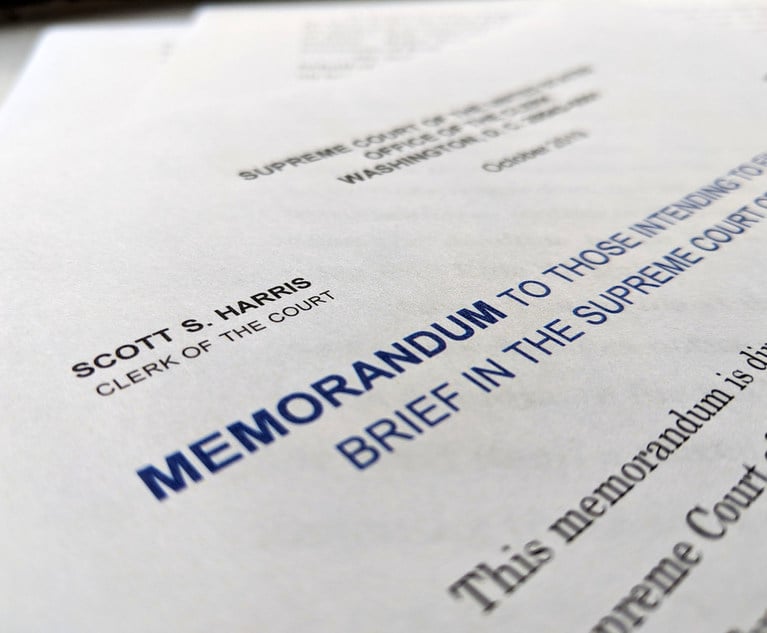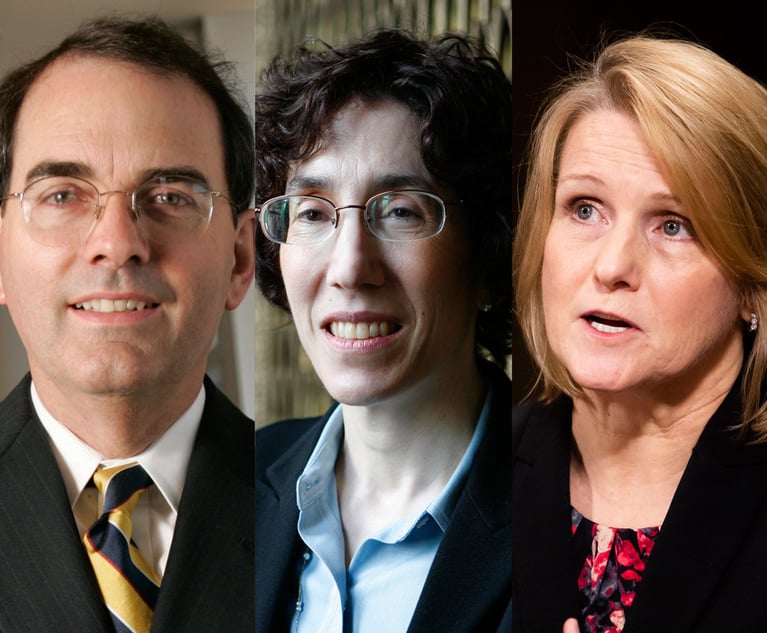 Justice Neil Gorsuch and Chief Justice John Roberts Jr. Credit: Diego M. Radzinschi / NLJ
Justice Neil Gorsuch and Chief Justice John Roberts Jr. Credit: Diego M. Radzinschi / NLJNew Book Tells Inside Stories of Feuding Justices, Anger Toward Trump
At one point, according to David Kaplan's new book, then-nominee Neil Gorsuch threatened to withdraw and “fly home to Colorado” because the Trump administration pressured him to “walk back” statements he made against Trump's disparagement of the judiciary.
September 04, 2018 at 12:30 PM
6 minute read
In a new book reminiscent of “The Brethren,” veteran legal affairs writer David Kaplan is telling behind-the-scenes stories about U.S. Supreme Court justices, including assertions that both Chief Justice John Roberts Jr. and Justice Neil Gorsuch expressed anger about President Donald Trump's comments about them.
At one point, the book states, then-nominee Gorsuch threatened to withdraw and “fly home to Colorado” because the Trump administration pressured him to “walk back” statements he made against Trump's disparagement of the judiciary.
Kaplan's book, titled “The Most Dangerous Branch: Inside the Supreme Court's Assault on the Constitution,” was officially released Tuesday by Crown Publishing, the same day Brett Kavanaugh's confirmation hearing began. Advance copies of Kaplan's book were circulated to news organizations, and he has been interviewed on CBS, NBC and NPR among other outlets, including the First Monday podcast.
The book intimates that Justice Anthony Kennedy decided to retire in part for health reasons, portrays Justice Elena Kagan as a tough boss for her clerks, and confirms Justice Stephen Breyer's “absent-minded professor” image.
As the title suggests, the overarching theme of the book is not personal anecdotes about the justices. Rather, Kaplan advances his view that the modern-day court is assuming too much power over American life, asserting itself into issues ranging from abortion to gun control, to the detriment of Congress and elected officials who should be in charge. “The justices intervene because they can,” Kaplan states.
But in an interview Monday, Kaplan, the former legal affairs editor of Newsweek, said that including anecdotes about the justices' personalities and interactions—almost the entire first half of the book—is pertinent to how they view the role of the court, and sheds light on a still-mysterious institution.
“They're just people,” Kaplan said. “Demythologizing the deities has a purpose. It helps the reader to understand that these unelected, unaccountable people are not gods.”
As with the 1979 book “The Brethren” by Bob Woodward and Scott Armstrong, Kaplan says his sources included justices and law clerks—a majority of justices and 65 law clerks to be exact. Asked if he has gotten feedback from any justices yet, Kaplan said: “It's pretty early yet, but I did hear from one justice who said, 'I'm enjoying your book so far.'”
What follows are some key anecdotes from Kaplan's book. A Supreme Court representative did not immediately respond to a request for comment.
➤➤ Kennedy's retirement: In considering whether to retire in 2018, Kennedy was “pulled in different directions” by his children—son Justin, a conservative who was friendly with Donald Trump Jr., and daughter Kristin, politically left of her father. Kaplan added, “Complicating matters was the concern of Kennedy family members that in their view he was having memory issues” that could make his future years on the court “increasingly difficult.” Kennedy is 82.
➤➤ Gorsuch vs. Trump: During Gorsuch's trips to Senate offices as he prepared for his confirmation hearing, Sen. Richard Blumenthal, D-Connecticut, told reporters that Gorsuch said Trump's verbal attacks on the federal judiciary were “disheartening” and “demoralizing.” Trump was furious, Kaplan writes, and told aides that Gorsuch was not being loyal. Former Senator Kelly Ayotte, who was guiding Gorsuch through the confirmation process, asked if he could “walk back” his comments, according to the book. Gorsuch reportedly refused, according to Kaplan, and said if the pressure continued, “I'll get on a plane and fly home to Colorado tonight.” The pressure stopped.
➤➤ Roberts vs. Trump: The chief justice did not take kindly to candidate Trump's persistent attack on Roberts in 2016 for voting to uphold Obamacare. Trump once said sarcastically that the health care law should be renamed Robertscare and said the chief justice was “an absolute disaster.” According to Kaplan, Roberts confided to a friend, “I've been a reliable conservative. Don't they realize I'm part of them?” Eventually, Roberts apparently calmed down, telling people that if both Republicans and Democrats were attacking him, he must be doing something right.
➤➤ Roberts vs. Gorsuch: As soon as Gorsuch joined the court in April 2017, Roberts suggested that he attend the court's private conference three days hence, at which justices consider granting or denying cert petitions. Gorsuch declined, indicating he needed time to catch up and catch his breath as well. Kaplan wrote that “Roberts was exasperated,” worried that Gorsuch would appear to the public as not being engaged in the court's work.
➤➤ Being Breyer: Law clerks find Breyer to be entertaining, and not just because he makes jokes, according to Kaplan. Clerks would fashion a bingo game with spaces for phrases often used during oral argument. The most winning phrase uttered by advocates was, “Justice Breyer, if I understand your hypothetical correctly…” That refers to Breyer's penchant for whimsical, rambling hypotheticals. Also, clerks had a hard time not laughing when Breyer would take them to lunch at a Mexican restaurant. Intent on his conversation, Breyer more than once ate his burrito without realizing the wrapping paper was still on it.
|Read more:
What Should the Senate #AskKavanaugh? Here's What You Told Us
This content has been archived. It is available through our partners, LexisNexis® and Bloomberg Law.
To view this content, please continue to their sites.
Not a Lexis Subscriber?
Subscribe Now
Not a Bloomberg Law Subscriber?
Subscribe Now
NOT FOR REPRINT
© 2024 ALM Global, LLC, All Rights Reserved. Request academic re-use from www.copyright.com. All other uses, submit a request to [email protected]. For more information visit Asset & Logo Licensing.
You Might Like
View All
Divided 5th Circuit Shoots Down Nasdaq Diversity Rules

Nevada Supreme Court to Decide Fate of Groundbreaking Contingency Cap Ballot Measure
5 minute read
Lawyers, Law Groups Oppose Proposal to Require Court Approval for Amicus Briefs

9th Circuit Judges Weigh if Section 230 Shields Grindr From Defective Design Claims
Trending Stories
Who Got The Work
Michael G. Bongiorno, Andrew Scott Dulberg and Elizabeth E. Driscoll from Wilmer Cutler Pickering Hale and Dorr have stepped in to represent Symbotic Inc., an A.I.-enabled technology platform that focuses on increasing supply chain efficiency, and other defendants in a pending shareholder derivative lawsuit. The case, filed Oct. 2 in Massachusetts District Court by the Brown Law Firm on behalf of Stephen Austen, accuses certain officers and directors of misleading investors in regard to Symbotic's potential for margin growth by failing to disclose that the company was not equipped to timely deploy its systems or manage expenses through project delays. The case, assigned to U.S. District Judge Nathaniel M. Gorton, is 1:24-cv-12522, Austen v. Cohen et al.
Who Got The Work
Edmund Polubinski and Marie Killmond of Davis Polk & Wardwell have entered appearances for data platform software development company MongoDB and other defendants in a pending shareholder derivative lawsuit. The action, filed Oct. 7 in New York Southern District Court by the Brown Law Firm, accuses the company's directors and/or officers of falsely expressing confidence in the company’s restructuring of its sales incentive plan and downplaying the severity of decreases in its upfront commitments. The case is 1:24-cv-07594, Roy v. Ittycheria et al.
Who Got The Work
Amy O. Bruchs and Kurt F. Ellison of Michael Best & Friedrich have entered appearances for Epic Systems Corp. in a pending employment discrimination lawsuit. The suit was filed Sept. 7 in Wisconsin Western District Court by Levine Eisberner LLC and Siri & Glimstad on behalf of a project manager who claims that he was wrongfully terminated after applying for a religious exemption to the defendant's COVID-19 vaccine mandate. The case, assigned to U.S. Magistrate Judge Anita Marie Boor, is 3:24-cv-00630, Secker, Nathan v. Epic Systems Corporation.
Who Got The Work
David X. Sullivan, Thomas J. Finn and Gregory A. Hall from McCarter & English have entered appearances for Sunrun Installation Services in a pending civil rights lawsuit. The complaint was filed Sept. 4 in Connecticut District Court by attorney Robert M. Berke on behalf of former employee George Edward Steins, who was arrested and charged with employing an unregistered home improvement salesperson. The complaint alleges that had Sunrun informed the Connecticut Department of Consumer Protection that the plaintiff's employment had ended in 2017 and that he no longer held Sunrun's home improvement contractor license, he would not have been hit with charges, which were dismissed in May 2024. The case, assigned to U.S. District Judge Jeffrey A. Meyer, is 3:24-cv-01423, Steins v. Sunrun, Inc. et al.
Who Got The Work
Greenberg Traurig shareholder Joshua L. Raskin has entered an appearance for boohoo.com UK Ltd. in a pending patent infringement lawsuit. The suit, filed Sept. 3 in Texas Eastern District Court by Rozier Hardt McDonough on behalf of Alto Dynamics, asserts five patents related to an online shopping platform. The case, assigned to U.S. District Judge Rodney Gilstrap, is 2:24-cv-00719, Alto Dynamics, LLC v. boohoo.com UK Limited.
Featured Firms
Law Offices of Gary Martin Hays & Associates, P.C.
(470) 294-1674
Law Offices of Mark E. Salomone
(857) 444-6468
Smith & Hassler
(713) 739-1250










